Gwanghui-dong in Jung-gu (district), Seoul, abuts the famous shopping area around Dongdaemun Gate, surrounded by tower shopping malls and open-air markets.
Another feature of this neighborhood is that it is home to Seoul's so-called "Russian Street." While walking along this road, decorated with various Cyrillic signboards and with various Russian food items on display in the windows, visitors can now find a new information center with a big signboard written in Korean and Russian saying, “Dongdaemun Information Center for Foreigners.”
The center is the first support center in Korea for foreigners who have a Russian linguistic background. It opened about two months ago.
Kim Joon Tae, founder of the center, is a former Korean civil servant. He studied in Russia during his public service career, which led him to take an interest in ethnic Koreans who live in Russia and in the former USSR. After coming back to Korea, he worked for government organizations where he helped to solve appeals and handled complaints from non-Koreans.
Kim said, “A lot of Russian speakers in Korea experience difficulties because they do not understand the Korean language. I thought of establishing a support center to help them.”
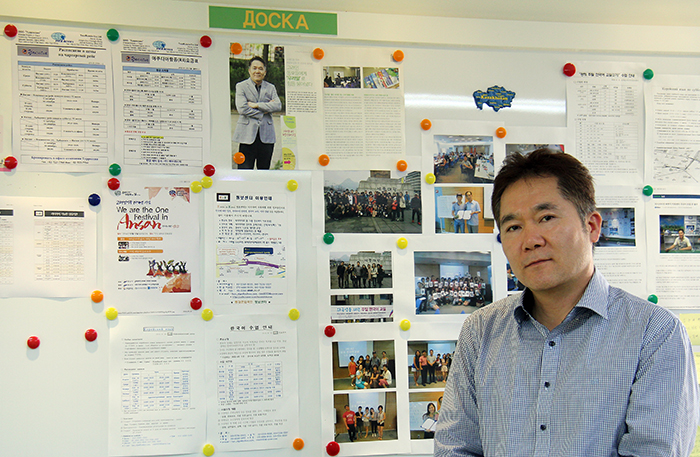
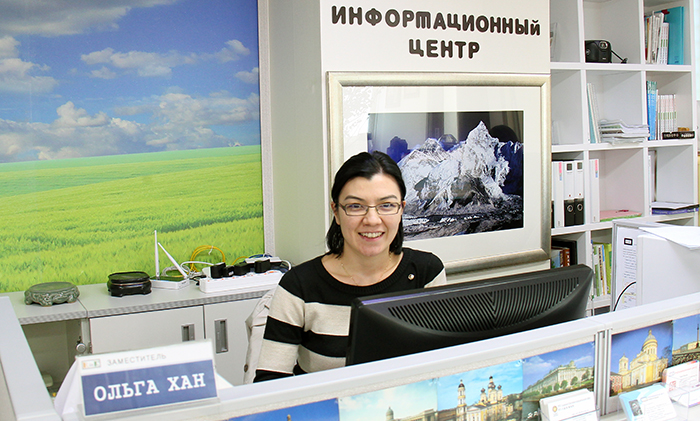
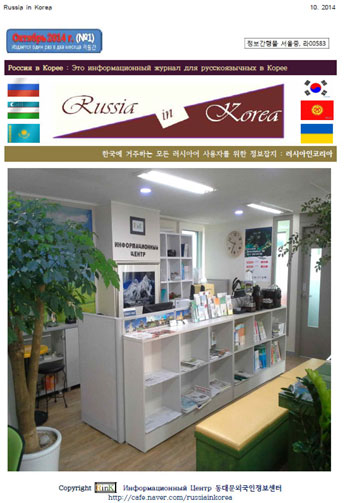
Most of the visitors to the center are from Russia or from countries with Russian-speaking populations, such as Kazakhstan, Kirgizstan, Ukraine or Uzbekistan. Many Russian-speaking ethnic Koreans, whose ancestors are from Korea, also visit the center. They learn about the center via the Internet or through SNS channels, such as Facebook, or through their friends and acquaintances. Visitors can receive counseling services on visas or on other subjects, such as the government's policy on foreigners. They can also learn some Korean language at the center, too.
The center runs Korean language classes twice per week and eight times per month. It also runs classes on the weekends so that more workers, who are perhaps unable to take classes during the week, can still learn the language. Kim said, “Even if only one student comes, we must run the class for that person.” He added that the center runs classes on the weekends so that more people can come and take the opportunity to learn the language.
Lee Jin, a worker at the center, is fluent in Russian and has lived in both Moscow and the Russian Far East for more than 10 years. Lee said with a shy smile that, “I feel so rewarded when we help people solve their difficulties through counseling and help them to regain their rights, which they are unable to claim due to the language barrier.”
Han Olga, another worker at the center and an ethnic Korean from Kazakhstan, said, “I feel happy to work for the center. I like everything about this place.”
Kim said, “We will publish the first edition of our magazine, ‘Russia in Korea,’ later this month. This bi-monthly magazine has all the information needed by Russian speakers in Korea.” In fact, the magazine contains essential information for foreigners, including government organizations where they can receive interpreting services in Russian, medical centers and information about the government's policy on foreigners. All the content is written in both Korean and Russian. The center will distribute the magazine to the embassies of Russia, Kazakhstan, Kirgizstan, Ukraine and Uzbekistan and to branches of Korean government bodies and companies in Russia, Kazakhstan, Kirgizstan, Ukraine and Uzbekistan. A total of 1,000 copies of the first edition of the magazine will be published.
“There is a lack of information about Korea for Russian speakers in the country,” said Kim. He said he tries to communicate with as many Russian speakers as possible via the Internet, Facebook or some other online communication channel, in order to inform them of the necessary information about the government’s policies concerning foreigners, visas, the legal system and employment.
Kim has been running an Internet café at the center where useful information can be found about government policies and laws concerning foreigners. Information about Korean language classes is also available at the café. To visit the café, please visit the link below:
http://cafe.naver.com/russiainkorea.
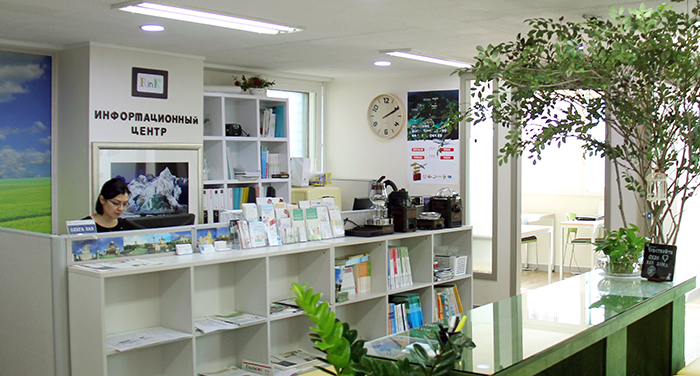
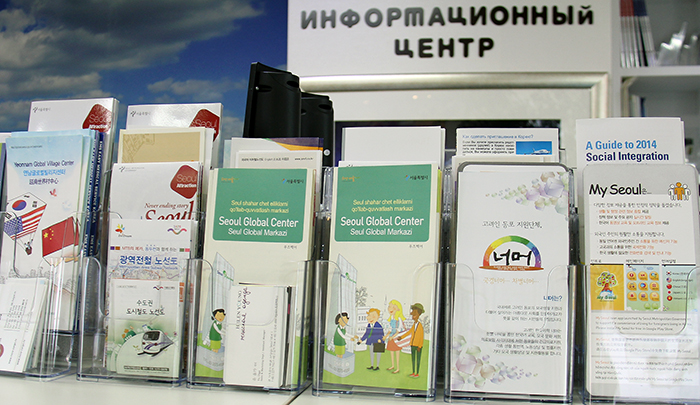
Korea.net had an interview with Kim.
Article, photos by Yoon Sojung
Korea.net Staff Writer
arete@korea.kr

Another feature of this neighborhood is that it is home to Seoul's so-called "Russian Street." While walking along this road, decorated with various Cyrillic signboards and with various Russian food items on display in the windows, visitors can now find a new information center with a big signboard written in Korean and Russian saying, “Dongdaemun Information Center for Foreigners.”
The center is the first support center in Korea for foreigners who have a Russian linguistic background. It opened about two months ago.
Kim Joon Tae, founder of the center, is a former Korean civil servant. He studied in Russia during his public service career, which led him to take an interest in ethnic Koreans who live in Russia and in the former USSR. After coming back to Korea, he worked for government organizations where he helped to solve appeals and handled complaints from non-Koreans.
Kim said, “A lot of Russian speakers in Korea experience difficulties because they do not understand the Korean language. I thought of establishing a support center to help them.”

Kim Jun Tae is the founder of the Dongdaemun Information Center for Foreigners.

Han Olga from Kazakhstan works at the center to provide counselling and to help manage the place.

The cover of the magazine 'Russia in Korea.' The first edition of this bi-monthly magazine will be published later this month.
Most of the visitors to the center are from Russia or from countries with Russian-speaking populations, such as Kazakhstan, Kirgizstan, Ukraine or Uzbekistan. Many Russian-speaking ethnic Koreans, whose ancestors are from Korea, also visit the center. They learn about the center via the Internet or through SNS channels, such as Facebook, or through their friends and acquaintances. Visitors can receive counseling services on visas or on other subjects, such as the government's policy on foreigners. They can also learn some Korean language at the center, too.
The center runs Korean language classes twice per week and eight times per month. It also runs classes on the weekends so that more workers, who are perhaps unable to take classes during the week, can still learn the language. Kim said, “Even if only one student comes, we must run the class for that person.” He added that the center runs classes on the weekends so that more people can come and take the opportunity to learn the language.
Lee Jin, a worker at the center, is fluent in Russian and has lived in both Moscow and the Russian Far East for more than 10 years. Lee said with a shy smile that, “I feel so rewarded when we help people solve their difficulties through counseling and help them to regain their rights, which they are unable to claim due to the language barrier.”
Han Olga, another worker at the center and an ethnic Korean from Kazakhstan, said, “I feel happy to work for the center. I like everything about this place.”
Kim said, “We will publish the first edition of our magazine, ‘Russia in Korea,’ later this month. This bi-monthly magazine has all the information needed by Russian speakers in Korea.” In fact, the magazine contains essential information for foreigners, including government organizations where they can receive interpreting services in Russian, medical centers and information about the government's policy on foreigners. All the content is written in both Korean and Russian. The center will distribute the magazine to the embassies of Russia, Kazakhstan, Kirgizstan, Ukraine and Uzbekistan and to branches of Korean government bodies and companies in Russia, Kazakhstan, Kirgizstan, Ukraine and Uzbekistan. A total of 1,000 copies of the first edition of the magazine will be published.
“There is a lack of information about Korea for Russian speakers in the country,” said Kim. He said he tries to communicate with as many Russian speakers as possible via the Internet, Facebook or some other online communication channel, in order to inform them of the necessary information about the government’s policies concerning foreigners, visas, the legal system and employment.
Kim has been running an Internet café at the center where useful information can be found about government policies and laws concerning foreigners. Information about Korean language classes is also available at the café. To visit the café, please visit the link below:
http://cafe.naver.com/russiainkorea.

The inside of the Dongdaemun Information Center for Foreigners.

The cener has various brochures about living in Korea, all in Russian.
Korea.net had an interview with Kim.
What made you establish the support center?
When I was working as a public servant, I studied in Russia for about three years where I learnt about ethnic Koreans in the former USSR. I became interested in their lives and their hardships. Ethnic Koreans do have a Korean background. Many of them live in Russia and former Soviet territories, like Kazakhstan, Kirgizstan, Ukraine or Uzbekistan.
When I came back to Korea, I handled difficulties and complaints from foreigners in Korea. My work made me interested in the difficulties faced by Chinese and Russian speakers in Korea. I wanted to help them.
Was there any special reason to target Russian speakers in Korea when building the support center?
Many ethnic Koreans hope to return to Korea. However, they still experience difficulties in Korea because they do not have an opportunity to learn the language. They do not have enough knowledge about the laws or systems in the country, either. Most of them engage in simple labor and often work during the weekend, too. So they cannot have any opportunity to learn the language. I also realized that there is not enough information about Korea written in Russian. That is why I thought about building a support center for them.
How many Russian speakers live in Korea at the moment? What are their reasons to stay in the country?
About 65,000 Russian speaking people live in Korea. Nearly 15 percent of them are illegal immigrants. Most of them come to Korea for economic reasons. They want to make money and engage in simple labor.
What difficulties do Russian speakers in Korea experience? What do the center's visitors expect from Korean society?
Most of them complain about difficulties in terms of laws, systems and policies concerning foreigners in Korea, especially about visas and employment. They hope more lenient visa rules would make their employment and economic activities in Korea easier. Since they do not know about the Korean language or alphabet, they lack many of the skills needed to properly use the law and other systems, which leads them to make mistakes or puts them into trouble. Many restraints on employment, such as changing workplace or finding jobs, also gives them a hard time.
What are the most difficult parts about managing the center? Are there any rewarding moments when running the center?
Difficulties come from the economic side of things. We have to pay many fixed costs, such as rent, the salary for the Korean language teachers, and so on. I had difficulties preparing for the establishment of the center, too, as it was all a burden on me. To open the center, I obtained a license to teach Korean language and volunteered to teach Korean at the Korean language classes offered by the local community center in Gwanghui-dong every weekend.
It is rewarding to help people who experience difficulties and to help solve their problems. Most of the problems are legal issues or visa issues. For example, when it comes to counseling overseas spouses, knowledge of both visa rules and laws are needed because their issues are often involved with family problems or couples, and the language barrier. When I help them to solve their problems, I feel so good. When I see people who study Korean at the center receive their desired outcome and achieve their goal, like an international marriage or obtaining a visa, I also feel happy.
What do you need most at the moment?
For the better management of the center, I hope the issue of the minimum fixed costs can be solved. Since this center opened as an independent center, which does not receive any support from any organization, we have to cover that part with a tuition fee for the Korean language classes, advertisements in the magazine and the cost for solving legal issues after some counseling. I hope things will get better when the center becomes more popular.
What services does the center offer to Russian speakers in Korea?
The center offers legal counseling and help services, and runs Korean language classes. Many people want counseling about visas or family issues. We introduce them to organizations where they can receive support for free. Counseling is free at our center. To solve their problems, however, it costs money. In the case of our Korean classes, we run classes twice a week and eight times a month. Fees vary according to the level of the class, starting at KRW 60,000 and ranging up to 120,000 a month.
When visiting the center, people can use the Internet on a Russian browser and receive various brochures about Korea in Russian. They can also send faxes to their home countries.
What do you want from Koreans or the Korean government?
First, language services. I hope more information about the government’s policies concerning foreigners can be translated into Russian.
Second, the government’s policies concerning foreigners seem to have excessive restrictions for non-Korean workers, especially in terms of visa rules and employment. Of course, I agree that some restrictions are necessary for the government. If possible, however, other restrictions can be eased.
Finally, in the case of Korean language education, most classes are targeted to marriage immigrants. Many classes are run on the weekday, and so many workers are unable to learn the language. I hope the target audience for language education could be widened so that more workers could have educational opportunities.
Article, photos by Yoon Sojung
Korea.net Staff Writer
arete@korea.kr